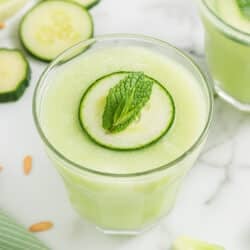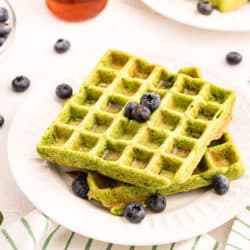Anti-Inflammatory Diet for Lymphedema (What to Eat & Avoid)
Lymphedema is a condition of swelling in the arms or legs and is often related to the removal of lymph nodes. In this article, I’ll share the basics of an Anti-Inflammatory Diet for Lymphedema, including foods to eat and foods to avoid.

What is Lymphedema?
Lymphedema is a condition where a blockage in the lymphatic system causes lymph fluid to pool in certain areas of the body.
This build-up of fluid causes pain and swelling, usually affecting the arms and the legs. Sometimes it can cause swelling in other parts of the body, too, including the abdomen, chest wall, and neck.
In some cases, it is mild and barely noticeable. In others, however, the swelling can be so significant that it can make it difficult to move your limbs, limiting your range of motion.
Lymphedema can lead to other problems, including blisters, changes to the texture and color of your skin, and – if it affects your head and neck – problems with breathing, swallowing, and talking.
It’s a condition that affects up to 10 million people in the US. While there is no cure, the good news is that eating the right foods and maintaining a healthy weight can significantly reduce your symptoms.
Swelling of Lymphatic System
Your lymphatic system – consisting of lymph vessels, lymph nodes, and lymphatic tissue – is an integral part of your immune system. It moves lymphatic fluid throughout your body, which carries the white blood cells needed to fight infections.
With lymphedema, damage to the lymphatic system causes that fluid to accumulate underneath the skin, causing swelling.
The most common cause of damage to the lymphatic system is cancer treatment involving the removal of lymph nodes or radiation therapy. But it can be caused by rare, inherited conditions like Milroy disease, too.
Research has shown that lymphedema often leads to inflammation in the areas affected, worsening the swelling and causing tissues to gradually become more firm.
So reducing inflammation throughout the body is another key factor in minimizing symptoms – and one that can be addressed through your diet.
Diet and Lymphedema
Improving your diet is one of the best things you can do to help control the symptoms of lymphedema. A nutritious diet is useful in two ways.
First, it can help you maintain a healthy body weight.
Being overweight puts the lymphatic vessels under more stress and is not only a risk factor for the condition but can also lead to cellulitis. So, try to make weight loss and weight control part of your lifestyle changes and treatment of lymphedema and the promotion of a healthy lymphatic system.
Secondly, eating the right foods and an overall anti-inflammatory diet can help reduce inflammation, strengthen connective tissues, and support your immune system, allowing the lymphatic system to drain and pass fluid more efficiently (good lymphatic drainage and lymphatic flow).
Top Foods to Include in a Lymphedema Diet
Here are the best foods to consume if you have lymphedema, all of which can help get your symptoms under control including fluid retention and high blood pressure.
The “best” diet for primary lymphedema or secondary lymphedema is likely an anti-inflammatory diet. You may wish to consult a registered dietitian who can further help create a special diet that includes anti-inflammatory foods that may help your lymph system.
1. Antioxidant-rich foods

Foods rich in antioxidants – primarily fruits, vegetables, nuts, and seeds – all help support your immune system and reduce inflammation throughout your body.
Foods particularly high in antioxidants include blueberries, strawberries, raspberries, leafy greens, pecans, kale, spinach, beets, and beans.
Aim to include a “rainbow” of fruits and vegetables in your diet, incorporating red, green, purple, orange, and yellow produce. This helps ensure that you are consuming a broad range of nutrients for the maximum benefits.
One easy way to get more of these foods is to make Anti-Bloating Smoothies!
2. High-protein foods
Protein plays a very important part in strengthening connective tissues. If you don’t consume enough, there’s a risk that fluid can seep into your tissues from your bloodstream, aggravating the symptoms of lymphedema.
Be sure to opt for lean proteins, which are lower in saturated fats, and aim to grill or bake meats rather than fry them.
Some excellent sources of lean protein are:
- Eggs
- Fish
- Lean cuts of red meat
- Poultry
- Beans
- Edamame
- Tofu
- Seeds
- Nuts
- Legumes
- Greek yogurt and other dairy products
- Cottage cheese
3. Whole Grains

Avoiding processed foods is important when you have lymphedema, making whole grains – rather than refined grains – the best option.
When grains are refined, two of their most nutritious layers – the bran and the germ – are removed. Whole grains have all their layers, meaning that they are richer in vitamins, minerals, and antioxidants. Subsequently, they are much better for your digestive health, which is important for your overall well-being. They can also help keep inflammation under control, thereby reducing lymphedema symptoms and swollen areas.
What’s more, whole grains are rich in fiber and release carbohydrates into the bloodstream very slowly. This means they provide a steady source of energy and help keep you full for longer. As a result, you’ll be less likely to snack between meals, making it easier to maintain a healthy weight.
Good sources of whole grains include:
- Bulgur
- Quinoa
- Farro
- Whole-grain cereals
- Whole-wheat bread and pasta
- Oatmeal
- Whole-wheat flour
- Barley
- Millet
- Brown rice
- Popcorn
4. Healthy fats
Fats are an important part of our diet – they give us energy, protect our organs, and help us absorb the “fat-soluble” vitamins A, D, E, and K. Some fats in particular are anti-inflammatory in nature and can help reduce the symptoms of lymphedema.
Sources of “healthy fats” include:
- Olive oil
- Avocados/avocado oil
- Nuts
- Seeds
Polyunsaturated omega-3 fatty acids are particularly useful in reducing inflammation and are found in a wide variety of foods, including:
- Flaxseeds
- Chia seeds
- Walnuts
- Mackerel
- Salmon
- Sardines
- Herrings
Some of the unhealthy fats you may wish to avoid during your lymphoma treatment include rancid fats or seed oils. See my related article on the best cooking oils to use.
Worst Foods for Lymphedema

Now you know which foods to include in an anti-inflammatory diet for lymphedema, it’s time to take a look at those you should consume less often, or cut out altogether.
Avoiding these worst foods for water retention and the circulatory system may help reduce risk factors and the risk of lymphedema.
Try to avoid high-sodium foods, processed foods and sugars, and alcoholic beverages which can all negatively affect lymphatic health. Instead, opt for a healthy diet full of whole foods that can help immune functioning overall lymphatic function.
1. High-sodium foods
Consuming lots of salt causes your body to retain water – something you want to avoid if you suffer from lymphedema.
Unfortunately, many foods contain a lot more salt than you might think, meaning it’s very important to check the packaging and avoid foods with a high sodium content.
Better still, try to focus on consuming whole, unprocessed foods so that you are in control of just how much salt is added.
Cut down as much as possible on canned and pickled foods, frozen meals or TV dinners, cured meats, and fast foods.
2. Processed foods and sugars
Processed and sugary foods like pastries, breakfast cereals, white bread, candy bars, chips, and fried foods are bad for lymphedema sufferers in many different ways.
They are loaded with unhealthy ingredients that can trigger or worsen inflammation. They also contain a lot more fat and calories than your body actually needs, which will eventually lead to weight gain.
What’s more, the calories in processed foods tend to be “empty”, meaning they have little nutritional value. This can lead to deficiencies in the vitamins and minerals that your body needs for good health.
And, because processed foods are low in important nutrients like fiber and healthy fats, you’re less likely to feel full after consuming them. This, of course, can lead to snacking between meals and choosing less nutritious food.
3. Certain alcoholic beverages
Alcohol is a diuretic, which means that it increases your output of urine. This raises the risk of becoming dehydrated – something you want to avoid if you have lymphedema, as it can increase swelling.
But there are other issues associated with alcohol, too.
It may increase inflammation and also weaken your already-compromised immune system, making you vulnerable to infection. It can also cause you to gain weight, and may even impair your judgment, making you more likely to be tempted by unhealthy, processed foods.
Importance of Hydration
Did you know that dehydration prompts your body to hold on to excess fluid? That’s not something you want to happen when you are dealing with lymphedema, meaning it’s important to stay properly hydrated at all times.
Adequate hydration also ensures that your lymphatic system can transport lymph fluid effectively through the body. Plus it helps keep your tissues elastic, stopping them from becoming uncomfortably stiff.
You need to be careful, however, to avoid sugary beverages and concentrate on clean sources of hydration. Water is ideal – set reminders on your phone to prompt you to drink at regular intervals, and carry a reusable bottle with you that you can keep topped up throughout the day.
If you’re not keen on plain water, try infusing it with fruit and/or herbs. Or try a herbal tea such as ginger tea (great for reducing inflammation) or green tea, which is rich in antioxidants.
Herbs to Consider
Three herbal supplements show promise in helping reduce the symptoms of lymphedema, although studies are still ongoing and the risks of taking these herbs are not yet fully known.
One is horse chestnut seed extract, found by researchers to be helpful when taken in conjunction with compression therapy.
Another is butcher’s broom, an evergreen shrub related to the lily. Experts found that it helped significantly reduce swelling in lymphedema patients when taken in combination with a type of antioxidant found in citrus fruit.
But perhaps the most commonly used is coumarin, a natural compound found in a variety of plants, including some grasses and cassia cinnamon.
However, it is important to speak to your healthcare adviser before taking any supplements, as they may interact with medications you are taking or have adverse effects on existing medical conditions.
Additional Lifestyle Recommendations
As you can see, the lymphedema diet can play a big part in reducing symptoms and improving your overall health.
But there are other things you can do to help control the progression of the condition.
- Take regular, enjoyable exercise. Walking, yoga, and swimming are ideal! These will help increase your range of motion, boosting the activity of the lymph vessels and improving circulation.
- Consider compression therapy. This can be as simple as wearing garments designed specifically to stop lymphatic fluid pooling in the affected areas. Speak to your healthcare provider about the level of compression you need.
- Treat yourself to regular massage sessions from a trained therapist. These can help with the movement of fluid through the lymphatic system to reduce swelling.
- Avoid tight clothing. This could prevent lymphatic fluid from circulating as it should.
- Make sure affected areas don’t get too hot or too cold. Don’t apply heat pads or ice and avoid spa facilities like saunas, which can worsen the swelling.
- Look after your skin. Keep it clean and check regularly for changes or lesions. Be sure to disinfect cuts quickly to avoid infection.
- Avoid standing for long periods. And aim to elevate the affected limb above heart level whenever you get a chance.
Lymphedema-Friendly Recipes
Conclusions
Consuming antioxidant-rich, whole foods and those high in proteins and healthy fats can help boost your immune system, strengthen connective tissues, and reduce inflammation. However, it’s important to remember that nutritional needs can vary from person to person, so it’s a good idea to speak to your healthcare provider for personalized dietary recommendations.
Nevertheless, it’s reassuring to be able to take back some control over your health, and rewarding to see the positive changes that a nutritious diet, tailored to your specific needs, can bring.
Don’t forget to join my newsletter list to get exclusive clean eating recipes and tips. The newsletter is 100% free with no spam; unsubscribe anytime.
About the Author: Carrie Forrest has a master’s degree in public health with a specialty in nutrition and is studying to be a holistic nutritionist. She is a top wellness and food blogger with over 5 million annual visitors to her site. Carrie has an incredible story of recovery from chronic illness and is passionate about helping other women transform their health. Send her a message through her contact form.
Note: this post is for informational purposes only and is not intended as medical advice. Please consult your healthcare provider for recommendations related to your individual situation.




















